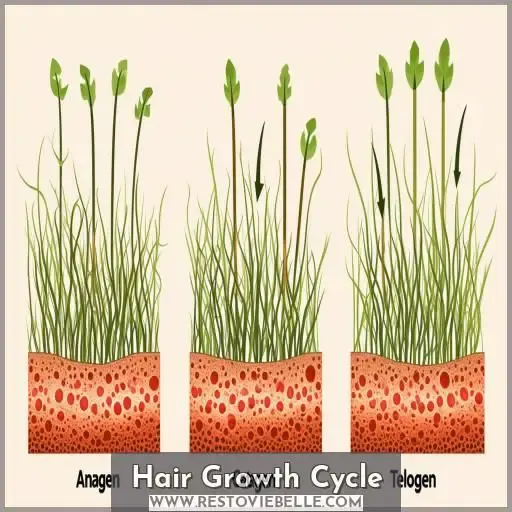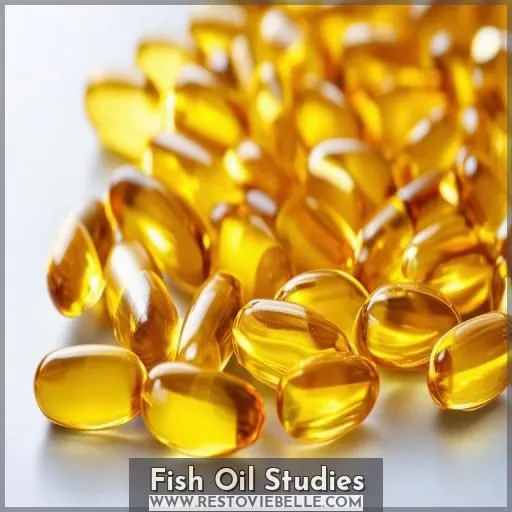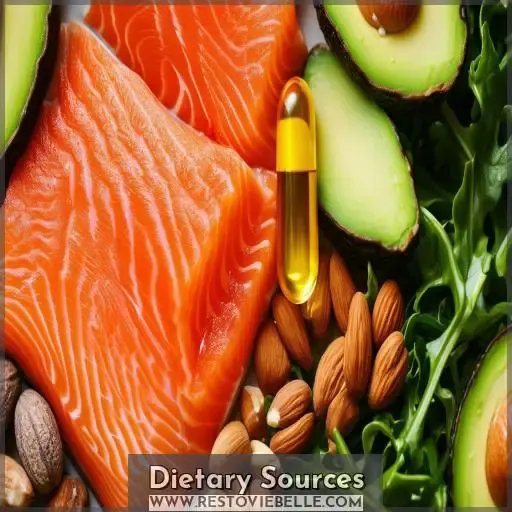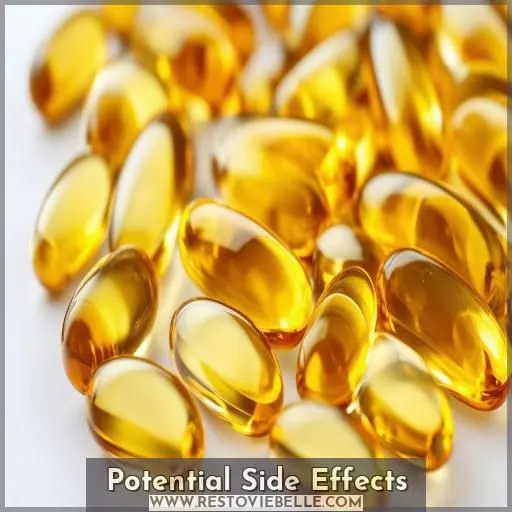This site is supported by our readers. We may earn a commission, at no cost to you, if you purchase through links.
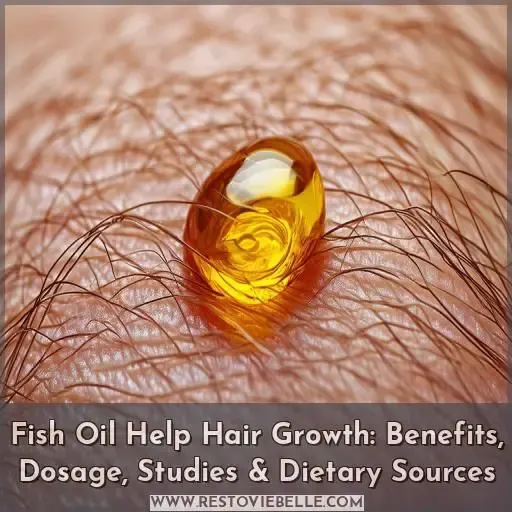 Sure thing—fish oil might be your hair’s best friend. Rich in Omega-3 fatty acids, fish oil supports hair follicle health and can help improve hair thickness and density.
Sure thing—fish oil might be your hair’s best friend. Rich in Omega-3 fatty acids, fish oil supports hair follicle health and can help improve hair thickness and density.
Studies have shown that it might extend the anagen phase (growth phase) and reduce hair loss. Starting with a daily dosage of 250-500 mg of EPA/DHA, you can boost this up to 5,000 mg if needed but consult your doctor first.
Omega-3s from fatty fish like salmon and mackerel, or alternatives like flaxseeds, can give your hair a nutritious lift. Curious to know more benefits and how to get started? Stick around!
Table Of Contents
- Key Takeaways
- Does Fish Oil Help Hair Growth?
- Omega-3 Fatty Acids
- Hair Growth Cycle
- Fish Oil Studies
- Dosage Recommendations
- Dietary Sources
- Potential Side Effects
- Frequently Asked Questions (FAQs)
- Does fish oil grow hair faster?
- Which is better for hair fish oil or biotin?
- How long does it take for omega-3 to work for hair?
- What vitamins help hair growth?
- Can fish oil reverse baldness or alopecia?
- Is fish oil more effective than minoxidil?
- How long does it take to see results?
- Are there any topical fish oil products?
- Are vegetarian omega-3 sources as effective for hair?
- Conclusion
Key Takeaways
- Omega-3 fatty acids like EPA and DHA found in fish oil are hair’s best friends. They nourish those roots and follicles, extending the growth phase and promoting thicker, fuller locks.
- While fish oil won’t make your hair sprout like wildflowers overnight, consistent use over 3-6 months can yield visibly luscious results. Good things come to those who wait, and patience is key!
- For a nutrient-packed punch, consider a dual approach: add fatty fish like salmon to your diet while also supplementing with fish oil capsules. Your hair will be swimming in omega-3 goodness!
- Navigating dosages can be tricky, so consult your doctor, especially if you’re already taking medications. They can guide you on the right amount to give your hair that extra oomph without rocking the boat.
Does Fish Oil Help Hair Growth?
Yes, fish oil may help hair growth. The omega-3 fatty acids in fish oil, such as EPA and DHA, have been shown in some studies to promote a healthier hair growth cycle and reduce hair loss.
Omega-3 Fatty Acids
Omega-3 fatty acids, particularly EPA and DHA found in fish oil, are powerful allies in promoting hair health. They support the structure of cell membranes, enhance energy production, and improve cardiovascular function—all essential for robust hair growth.
These critical nutrients can’t be synthesized by the body, making supplementation or dietary intake essential. For effective absorption, it’s best to consume fish oil with a fatty meal, ensuring maximum efficacy.
If you’re omega-3 deficient, fish oil provides an excellent, reliable solution.
Hair Growth Cycle
The hair growth cycle consists of three main phases: anagen (growth), telogen (rest), and catagen (transition). Fish oil, rich in omega-3 fatty acids like DHA and EPA, can enhance this cycle by extending the anagen phase, reducing the telogen phase, and promoting scalp circulation. This supports hair follicle health, improving hair thickness and density.
- Anagen Phase: Extends growth period.
- Telogen Phase: Shortens rest period.
- Hair Follicle: Enhances scalp circulation and health.
Fish Oil Studies
Numerous studies explore fish oil’s impact on hair growth. Both animal and human trials demonstrate its efficacy and safety. For instance, a 2015 study showed increased hair growth and reduced hair loss in women after six months of omega-3 supplementation. Similarly, animal studies indicate that fermented mackerel oil can extend the anagen phase, essential for hair growth. Here’s a snapshot:
| Study Type | Year | Findings | Key Takeaway |
|---|---|---|---|
| Human Trial | 2015 | Increased hair growth, reduced hair loss | Effective in women |
| Animal Study | 2018 | Anagen phase extension | Promotes growth |
| Human Trial | 2015 | Increased hair density | Enhanced thickness |
| Human Anecdotal | Varied | Healthier, shinier hair | Positive anecdotal |
Dosage Recommendations
When considering dosage recommendations for fish oil supplements to support hair growth, start with 250-500 mg of combined EPA and DHA per day . Follow these guidelines:
- Consult a physician to personalize your dosage, especially if you have health conditions (Source).
- Gradually increase the dosage up to 5,000 mg, if recommended .
- Obtain omega-3 from both supplements and fatty fish (Source).
- Monitor for side effects, especially if you take anticoagulant medications .
Dietary Sources
Let’s explore the dietary sources abundant in omega-3 for hair health. Fish oil varieties high in omega-3 concentration are ideal for enhancing hair growth. Here are some top sources:
| Food | Omega-3 Content | Additional Benefits |
|---|---|---|
| Salmon | High | Brain lipids, heart health |
| Mackerel | High | Cardiovascular benefits |
| Herring | Moderate | Anti-inflammatory |
| Flaxseeds | Plant-based | Sustainable alternative |
| Chia Seeds | Plant-based | Digestive health |
Incorporating these options facilitates a balanced intake of essential nutrients.
Potential Side Effects
Potential side effects of fish oil supplementation and topical application include:
- Gastrointestinal discomfort, nausea, and diarrhea which can upset your stomach .
- Odoriferous sweat and bad breath, common with high doses .
- Drug interactions: Fish oil might interfere with anticoagulant medications, slowing blood clotting, posing a risk if you’re on blood thinners (Source).
- Headaches: Some users report mild headaches initially .
Does fish oil help hair growth? Yes, but monitor for side effects .
Frequently Asked Questions (FAQs)
Does fish oil grow hair faster?
At the end of the day, fish oil won’t make your hair grow like weeds, but it can nourish strands from root to tip, potentially extending the growth phase. While results vary, incorporating omega-3s into your diet or routine is a healthy step toward fuller, shinier locks.
Which is better for hair fish oil or biotin?
Both fish oil and biotin support hair health, but they work differently. Fish oil may extend the growth phase, while biotin assists with producing hair protein. For ideal results, consider incorporating both into your routine under guidance from a healthcare professional.
How long does it take for omega-3 to work for hair?
Water finds its level—it takes at least three to six months of consistent use for omega-3s to noticeably improve hair growth and thickness. Be patient, incorporate omega-3-rich foods like salmon and walnuts, and your fuller, lustrous locks will surface.
What vitamins help hair growth?
You’ll want biotin, vitamin C, niacin, iron, zinc, and protein for ideal hair growth. Eat a varied, nutrient-rich diet with foods like eggs, legumes, leafy greens, nuts, and fatty fish.
Can fish oil reverse baldness or alopecia?
Like a lustrous mane, fish oil’s fatty acids could potentially reverse hair loss. Studies suggest omega-3s may promote growth, but more research on baldness is needed. Nonetheless, it’s a promising, natural approach worth exploring with your dermatologist.
Is fish oil more effective than minoxidil?
While fish oil may promote hair growth, evidence suggests minoxidil (Rogaine) is more effective for treating hair loss. Consult a dermatologist to determine the best treatment plan for your specific needs.
How long does it take to see results?
You can expect to see results from fish oil for hair growth in 3-6 months with consistent use. Be patient, as it takes time for the omega-3s to nourish follicles and promote fuller, healthier hair.
Are there any topical fish oil products?
There are a mind-boggling variety of topical fish oil products that may help your luscious locks thrive! From hydrating hair serums to scalp treatments, these science-backed oils nourish strands, potentially promoting growth and reducing shedding. Always consult your stylist for the most suitable formulation.
Are vegetarian omega-3 sources as effective for hair?
You can get omega-3s from plant sources like flaxseeds, walnuts, and chia seeds. While research is limited, these may provide similar hair benefits to fish oil.
Conclusion
Coincidentally, if you’re looking to promote hair growth, incorporating fish oil into your routine could be a game-changer.
Studies showcase its ability to extend the anagen phase and reduce shedding, thanks to its Omega-3 content.
By consuming adequate EPA/DHA from dietary sources like fatty fish or supplements, you’ll nourish those follicles for thicker, fuller locks.
Consider making fish oil a staple—your hair will thank you.

